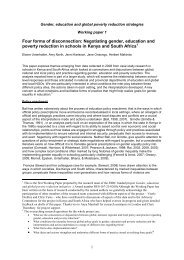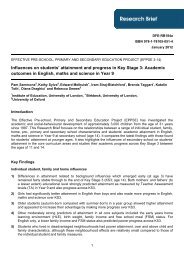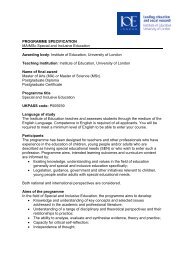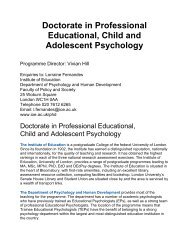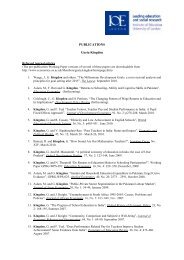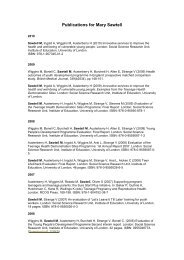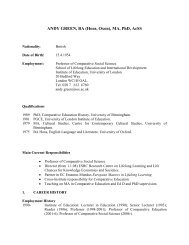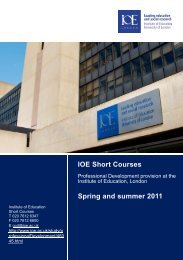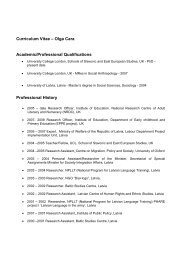Issue 3 - Institute of Education, University of London
Issue 3 - Institute of Education, University of London
Issue 3 - Institute of Education, University of London
You also want an ePaper? Increase the reach of your titles
YUMPU automatically turns print PDFs into web optimized ePapers that Google loves.
How can every school become a great school? <strong>London</strong> InstEd<br />
spoke to school improvement activist David Hopkins to ask<br />
for his recommendations<br />
ASK any parent about the<br />
goal <strong>of</strong> educational reform<br />
and the answer is simple –<br />
every school should be a great school.<br />
After all, every parent wants their child<br />
to have the best education possible.<br />
However, although easy to articulate,<br />
it is far more difficult to put into<br />
practice. It focuses reform efforts directly<br />
on enhancing teaching quality and<br />
classroom practice rather than structural<br />
change and requires a commitment<br />
to sustained, systemic change.<br />
Despite the political boldness<br />
required for this approach, it was<br />
adopted by New Labour in 1997.<br />
Most agreed that standards were<br />
22 <strong>London</strong> InstEd issue 3 autumn term<br />
too low and that direct state<br />
intervention was needed. The resultant<br />
“national prescription” proved successful<br />
at first, particularly in raising standards<br />
in primary schools, but progress<br />
plateaued in the second term and<br />
there was a recognition that it was<br />
schools themselves that needed to<br />
lead the next phase <strong>of</strong> reform.<br />
But, as Pr<strong>of</strong>essor Hopkins explains,<br />
large-scale reform can neither be only<br />
nationally led nor only schools-led –<br />
both must support each other within<br />
a system committed to raising the bar<br />
and narrowing the gap.<br />
Schools must use external standards<br />
to clarify, integrate and raise their own<br />
expectations, he adds. But equally<br />
schools, on their own and in networks,<br />
must be enabled to lead improvements<br />
and innovations in teaching and learning<br />
with the support <strong>of</strong> highly specified,<br />
but not prescribed, best practices.<br />
So, what are the trends that can<br />
make every school a great school?<br />
Pr<strong>of</strong>essor Hopkins, who is the inaugural<br />
HSBC Chair in international leadership<br />
at the <strong>London</strong> Centre for Leadership<br />
in Learning at the IOE, believes the<br />
trends are:<br />
Personalised learning. This provides<br />
a bridge from prescribed forms <strong>of</strong><br />
teaching, curriculum and assessment<br />
to an approach where teachers tailor<br />
teaching and learning to enable every<br />
student to reach their potential.<br />
Informed pr<strong>of</strong>essionalism.<br />
Teachers using data to apply a rich<br />
repertoire <strong>of</strong> pedagogic strategies to




